Saturday, October 29, 2005
(was Flying Talking Donkey)
And yes I will update my links!
Wednesday, October 26, 2005
The Slow Crash
Imagine the end of the world in moderation. It's hard. We tend to imagine that either the "economy" will recover and we'll go on like 1999 forever, plus flying cars, or else one day "the apocalypse happens" and every component of the industrial system is utterly gone.He denounces the images of people running wild in the streets. He starts out with the question of electricity: "When the lights go out, we won't go berzerk -- we'll go to bed earlier." Gasoline and water are dispatched. Food is more problematic, but he does not believe "the lack of food will make people kill each other." He has plenty of examples to counter that.
...[T]he interesting question is not "How will people die?" but "How will people live?" In the town next to the mass grave, what will we do all day? Process data and feign enthusiasm? Get on the internet? Make crossbows? Tend fruit trees? The best I can figure it out is to look at a bunch of more and less likely modifiers to the world as we know it, and think through how they could change things.He goes on to look at the effects of various possibilities, including peak oil, economic depression, WWIII, secret weapons, China, serial Falluja, disease, weather, astronomy, and finally, a human consciousness shift.
Interesting reading. And be sure to give the appendixes at the end a look.
Tuesday, October 25, 2005
Medicine Bow

Medicine Bow, where I took the Plant ID course last weekend, is "A primitive school of Earthlore in the North Georgia mountains...that specializes in Native American survival skills (primitive skills) and nature classes. Besides a year round schedule of courses at the school, Medicine Bow carries programs to you on all aspects of Indian lore; such as: using wild plants for food and medicine, tracking, archery, history, canoeing, sign language and other facets of environmental education."
We learned about identifying plants Saturday morning and then spent the rest of the weekend traipsing around the beautiful Appalachian ecosystem looking at plants and learning about their gifts. We harvested tubers and nuts and Sunday afternoon we cooked them up and sampled them. I found out I loved Solomon Seal. We have lots of acorns on our property so I was interested in preparing them as well. We even learned how to make rope. Saturday night he offered an introduction to Native American sign language.
Mark Warren, the owner and our guide had a wonderful presence informed by the Cherokee world view. We learned to respect the "Standing People" (as the Cherokee call the trees and plants) and appreciate what they have to offer us. It was a very nurturing way to address survival issues.
If you live out in this neck of the woods, I highly recommend it.
Friday, October 21, 2005
Plant Identification Course
 This weekend I will be taking the first in what I hope to be a series of basic survival courses. So far my peak oil education has included basic first aid from the Red Cross, group facilitation from Communities at Work and this Plant Identification course from Medicine Bow. I'll tell you more when I get back. Have a safe weekend!
This weekend I will be taking the first in what I hope to be a series of basic survival courses. So far my peak oil education has included basic first aid from the Red Cross, group facilitation from Communities at Work and this Plant Identification course from Medicine Bow. I'll tell you more when I get back. Have a safe weekend!
Thursday, October 20, 2005
Groups taking action
I am of the opinion that while we each need to take individual action to prepare ourselves for an uncertain future, our ultimate survival will depend on how well our communities function. So I am very heartened whenever I hear of groups and communities coming together to address the challenges. Here are some links to homepages of some of these groups.
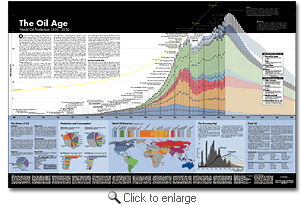 http://www.oilposter.org/ (Produced by the San Francisco Oil Awareness Meetup group)
http://www.oilposter.org/ (Produced by the San Francisco Oil Awareness Meetup group)
Colorful and authoritative, this poster traces the history of the Oil Age from its beginnings in the hills of western Pennsylvania in 1859 to its rise as the engine of global industrial economies. The poster's main chart features a year-by-year rendering of worldwide oil production from 1859 to 2050 with projections of future production based on Colin Campbell's Oil Depletion Model.
http://www.peakoilaction.org/ (Produced by the Los Angeles Oil Awareness Meetup group)
This website was created to further promote discussion about peak oil production, to focus on raising awareness in our community on this topic, and to create communities working torwards energy self-sufficiency.
http://eonsnow.org/ (San Diego Post Carbon Institute group)
This project is called "EONS Now" which is short for "End Oppressive Non-Sustainability NOW." (It could equally well mean "Earthlings Overwhelmingly Need Sanity NOW".) It is a project which aims to educate and enlighten people about the dominance of various forces which are non-sustainable at their core, what that means for society, and then what some options are for the future when these oppressive systems dissolve and become dysfunctional in the era of fading oil and gas supplies which allowed them to prosper. Despite there being a number of admittedly bleak topics covered, there is hope because we don't have to carry on this failed experiment. Envisioning a world with less corruption, pollution, alienation, and fear is a first step toward realizing such a world.
http://www.portlandpeakoil.org/ (Portland Oil Awareness Meetup group) 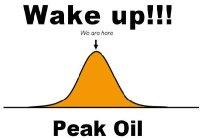
We're a grassroots group of concerned local citizens, from different backgrounds, with different interests, who've separately become aware of the looming crisis caused by the peaking of world oil supplies. WeÂ’ve come together to try to:
- Develop individual and collective strategies to cope with this crisis
- Create awareness in the Portland community about Peak Oil
- Influence policies of local government to help mitigate the crisis
- Serve as a community resource as the crisis becomes more severe
http://www.seattleoil.com/ (Seattle Oil Awareness Meetup group)
Seattle Peak Oil Awareness is a local citizens action network offering information and practical ideas for living in a time of reduced energy availability. Working in small, focused groups we advocate healthy, sustainable living choices for all interested residents in the Puget Sound region.
 http://www.willitseconomiclocalization.org/index.htm (Willits Economic LocaLization)
http://www.willitseconomiclocalization.org/index.htm (Willits Economic LocaLization)
The primary objectives of the Willits Economic LocaLization project are 1) to determine current resource use in the community of Willits, California (energy, transportation, food, housing, etc.), 2) to determine how that community can reduce its consumption of those resources imported, 3) to determine local resources that can replace those imported from outside the community and 4) to implement this transition towards a localized economy.
http://ibiblio.org/tcrp/doc/project.htm (Ithica, NY and surrounds project)
Every location will bring its own set of strengths and weaknesses to its struggle with the economic, social, and material consequences of the end of cheap oil. So unlike most sustainability plans, which apply now and apply almost universally to the U.S. and other developed countries, this project aims to develop a plan that will apply in the near future and will address the specific strengths and weaknesses of Tompkins County. This kind of plan is called "county relocalization." It is based on the belief that the size of counties and the traditional land use, welfare, and emergency management functions of counties puts them at the organizational level most appropriate to the management of emergency relocalization. In our case, it allows the plan to recognize and make best use of the unique blend of rural, town, and university resources in Tompkins County. The general outline of the TCRP may be applicable to other counties as well, but the objective is to map out in detail the measures to be taken right here.
http://www.sydneypeakoil.com/index1.html
Raising Sydney's awareness of global oil depletion and the possible consequences
Each of these websites and documents can serve as inspiration and modeling for our own local efforts. Want to get involved? One way to start is through Oil Awareness Meetup groups, another is through Post Carbon Institute Outposts. Either way will begin the process of getting to know your concerned neighbors. There may already be a group meeting near you. You've only got to loose your isolation!
Wednesday, October 19, 2005
Bioneers update
Orr and McKibben were among the presenters to mention Peak Oil, which was not on this year's program as a separate topic. However, conference participants organized two discussions on Peak Oil. Dave Room of Post Carbon Institute explained to about 70 listeners that the underlying cause of high oil and gasoline prices is burgeoning demand for petroleum while supply nears its limits. Once the rate of global oil production peaks, Room says "we will no longer be able to rely on 6,000 mile supply chains for the goods we use on a daily basis. We will increasingly need to re-localize our food, water, energy, and money systems and begin manufacturing essential goods more locally."Hopefully next year Peak Oil will be in the scheduling consciousness. I'm pleased to hear about the turnout for the topic.
Richard Heinberg, author of "The Party's Over" and "Powerdown," explained to another 75 people the following day that "Peak Oil is the good news. It will lead to a collapse of industrial society. It will involve hardship for humanity, but eventually we will have to create the sustainable society that many of us have been talking about for years."
Tuesday, October 18, 2005
Bioneers conference
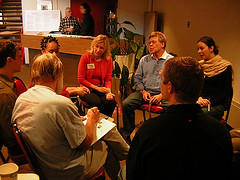
The 16th annual Bioneers Conference was held in San Rafael, CA last weekend. They also had concurrent conferences across the nation. I will be going to one next weekend in Atlanta. So what is Bioneers, you ask?
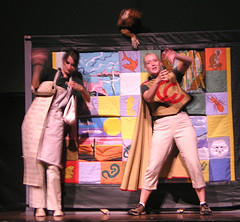
Founded in 1990, Bioneers is a nonprofit organization that promotes practical environmental solutions and innovative social strategies for restoring the Earth and communities.
They have a slogan: "It's all alive, its all intelligent, it's all connected, it's all relatives." They break it down this way:
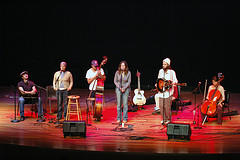
It's all alive.
ONE OF THE BEAUTIES OF BIOLOGY IS THAT ITS FACTS CAN BECOME OUR metaphors, and these underlying codes serve as inspiring parables for how we can organize a more just, humane and authentically sustainable society. Life has the answers to our problems. --> It's all intelligent.
It's all intelligent.
INTERDEPENDENCE ALSO TEACHES US THAT THERE ARE NO SINGLE ISSUES because it's one whole that can be addressed only by bringing together all the parts. Bioneers gathers people at the crossroads of ecological restoration, human health and social justice. There is only one cause - it is all of them -->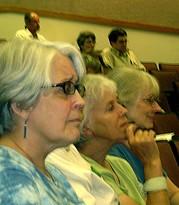
It's all connected.
THE BIONEERS SPAN ALL FIELDS, CULTURES, AGES AND WALKS OF LIFE. The work ranges from science to spirit - local to global - academia to the grass roots - farm to city - business to public service - art to engineering. We celebrate the gift of life in all its diversity and mystery, conjuring a change of heart to renew our empathic connection with the web of life and the Earth, our home. We are one -->
It's all relatives.
They have a blog that people from different locations contributed to, with both words and images. (The pictures are for you, Steve!)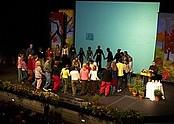
We ended the day with a closing circle, and Juanita Hull-Carlson led us in a prayer she found in Whole Earth Magazine:I pledge allegiance to the earth, and all the life it supports. One planet, in our care, irreplaceable with respect and sustenance for all.
I thought this summed up the weekend.
The conference reaches beyond the borders of California:
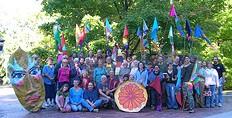
For the fourth year in a row, the speeches given during the Bioneers Conference plenary sessions will be broadcast live via satellite in schools and communities around North America. We work with partners in universities, nonprofits and community centers to develop locally relevant Bioneers satellite conferences. Each community organizes an event to complement the plenary sessions, with workshops tailored to the needs of specific bioregions.

Atlanta's conference will be next weekend. One of my Oil Awareness Meetup group members, Allyson A. Bates III, is on the Peak Oil panel on Friday at 3:15-3:45.

Sunday, October 16, 2005
Waiting for the lights to go out
Bryan Appleyard, science-and-philosophy columnist for the Times, discusses progress:
The greatest getting-and-spending spree in the history of the world is about to end. The 200-year boom that gave citizens of the industrial world levels of wealth, health and longevity beyond anything previously known to humanity is threatened on every side. Oil is running out; the climate is changing at a potentially catastrophic rate; wars over scarce resources are brewing; finally, most shocking of all, we don't seem to be having enough ideas about how to fix any of these things.One of the most important shifts in my point of view occurred when I understood that the (cheap) oil age is/was an aberration in the history of humanity:
...[I]t is necessary to grasp just how extraordinary, how utterly unprecedented are the privileges we in the developed world enjoy now. Born today, you could expect to live 25 to 30 years longer than your Victorian forebears, up to 45 years longer than your medieval ancestors and at least 55 years longer than your Stone Age precursors. It is highly unlikely that your birth will kill you or your mother or that, in later life, you will suffer typhoid, plague, smallpox, dysentery, polio, or dentistry without anaesthetic.This trend has given rise to our expectations that it would continue, that it is a "law of nature." The Peak Oil question contradicts this assumption. Not only are we running out of cheap oil, we don't have the technology or infrastructure to replace it.
Even if we did throw money at the problem, it's not certain we could fix it. One of the strangest portents of the end of progress is the recent discovery that humans are losing their ability to come up with new ideas.This is an astonishing claim and points out the folly of counting on a technological cure for our problems. Some were taken aback by it. But Huebner did find a supporter in Ben Jones:
Jonathan Huebner is an amiable, very polite and very correct physicist who works at the Pentagon's Naval Air Warfare Center in China Lake, California. e took the job in 1985, when he was 26. An older scientist told him how lucky he was. In the course of his career, he could expect to see huge scientific and technological advances. But by 1990, Huebner had begun to suspect the old man was wrong. "The number of advances wasn't increasing exponentially, I hadn't seen as many as I had expected — not in any particular area, just generally."
Puzzled, he undertook some research of his own. He began to study the rate of significant innovations as catalogued in a standard work entitled The History of Science and Technology. After some elaborate mathematics, he came to a conclusion that raised serious questions about our continued ability to sustain progress. What he found was that the rate of innovation peaked in 1873 and has been declining ever since. In fact, our current rate of innovation — which Huebner puts at seven important technological developments per billion people per year — is about the same as it was in 1600. By 2024 it will have slumped to the same level as it was in the Dark Ages, the period between the end of the Roman empire and the start of the Middle Ages.
What Jones has discovered is that we have to work harder and harder to sustain growth through innovation. More and more money has to be poured into research and development and we have to deploy more people in these areas just to keep up. "The result is," says Jones, "that the average individual innovator is having a smaller and smaller impact."The real problem that this points out is that our economy is predicated on growth. The end of innovation means an economic crash. But the optimists have something to say about this.
The argument is that, since the 18th-century Enlightenment, a new term has entered the human equation. This is the accumulation of and a free market in knowledge. As Mokyr puts it, we no longer behead people for saying the wrong thing — we listen to them. This "social knowledge" is progressive because it allows ideas to be tested and the most effective to survive. This knowledge is embodied in institutions, which, unlike individuals, can rise above our animal natures...But these can go wrong. "The thing that scares me," he says, "is that these institutions can misfire."This happened "in Russia in 1917 and Germany in 1933, producing years of slaughter on a scale previously unseen in human history. For Mokyr, those misfirings produced not an institutionalism of our knowledge but of our aggressive, animal natures."
Globalism was thought to be the expansion of democratic ideals, a sure sign of progress. But there is scriticismisim that globalism "is often just making the rich richer and the poor poorer. It is also destroying local culture and inspiring aggressive resistance movements, from student demonstrators in the West to radical Islamicists in the Middle East. Progress is built on very fragile foundations."
John Gray presents another point of view. Institutions will reflect human flaws. "Modernity does not make us better, it just makes us more effective."
In the past we looked to the hallmark of torture to prove our civility. But in the age of terrorist, is torture something we would rule out?
Dershowitz thinks a legal basis for torture would prevent abuses like the horrors perpetrated in Abu Ghraib prison in Iraq. If, for example, Tony Blair or George Bush had to sign a torture warrant, the whole business would be kept visible and legal...We just have to accept that three steps forward also involves two steps back.Appleyard ends with an ironic observation about pronouncements concerning the end of the world:
Of course, the end of the world has been promised by Jews, Christians, Muslims and assorted crazies with sandwich boards for as long as there has been a human world to end. But those doomsdays were the product of faith; reason always used to say the world will continue. The point about the new apocalypse is that this situation has reversed. Now faith tells us we will be able to solve our problems; reason says we have no answers now and none are likely in the future.What will the future hold? How will we respond to the immense problems we face? Our personal plans will depend on our view of the nature of humanity. Difficult but important questions to ponder.
Saturday, October 15, 2005
Gore's speech
I came here today because I believe that American democracy is in grave danger. It is no longer possible to ignore the strangeness of our public discourse . I know that I am not the only one who feels that something has gone basically and badly wrong in the way America's fabled "marketplace of ideas" now functions.The commentary at the bottom of the speech is interesting as well. Do your civic duty and spend a few minutes considering the marketplace of ideas.
How many of you, I wonder, have heard a friend or a family member in the last few years remark that it's almost as if America has entered "an alternate universe"?
I thought maybe it was an aberration when three-quarters of Americans said they believed that Saddam Hussein was responsible for attacking us on September 11, 2001. But more than four years later, between a third and a half still believe Saddam was personally responsible for planning and supporting the attack.
At first I thought the exhaustive, non-stop coverage of the O.J. trial was just an unfortunate excess that marked an unwelcome departure from the normal good sense and judgment of our television news media. But now we know that it was merely an early example of a new pattern of serial obsessions that periodically take over the airwaves for weeks at a time.
Monday, October 10, 2005
Community At Work
I'm writing from California and I've been enjoying my trip very much. I went to a three-day seminar produced by Community At Work. They specialize in group decision-making, and trained the participants to facilitate groups of all kinds to do just that. We got practical tools, experience, feedback, a little theory and a lot of heart. Our primary job as facilitators is to respect the group members and support them in doing their best thinking. There is something profoundly transformative about this practice. I came away feeling inspired and encouraged.
I also am beginning to articulate what it is I want to do professionally. I would like to facilitate communities of all kinds that want to become more sustainable. I believe we have a huge challenge in front of us and I would like to help people come up with solutions. I don't have the answers, in fact I am not sure if anyone does, but I have an understanding of the process that it takes to confront complex problems and work through them as a group.
Their next workshop is December 6-8, 2005, in San Francisco. If you have any interest in learning facilitation skills, I highly recommend it.
Sunday, October 02, 2005
Seminar

Tomorrow I'm off to a seminar on facilitating groups. I'll tell you all about it when I get back.
Here's my link for the day: Ianqui at The Oil Drum on flying verses driving.
Saturday, October 01, 2005
Cassandra Syndrome
There are several trends in the present world that, according to Stein's Law, will come to an end. These can be described as: the dollar bubble, the bond market bubble, the real estate bubble, and the stock market bubble. In some ways, these are not four discrete things but four manifestations of the same underlying condition.Let's start with the dollar bubble:
Over the past decade, East Asian central banks have manipulated the dollar, pushing it to unsupportable levels. This has made East Asian exports far cheaper than our domestically produced goods and has encouraged the continued outsourcing of US factories to East Asia. Much of this outsourcing has been done by "American" corporations--corporations that though organized under and protected by the laws of this land have no apparent loyalty to this nation or its citizens.The bond market bubble:
...real interest rates are negative. One consequence of these negative long-term interest rates is the current real estate bubble. Negative interest rates represent "free money" in that loans taken out now can be repaid with watered down currency in the future with the borrower keeping the difference in real purchasing power. The East Asian nations, and in particular China, are willing to subsidize America's buying binge because of the strategic advantage they gain as we become more and more dependent on imports for so many of the items we find necessary for modern living.
The real estate bubble:
Home prices peaked in August 2005. There will still be positive year over year comparisons for a few more months. But prices are now going down, and very likely they will continue to go down for many years to come. Get used to it. These $200,000 homes that were selling for $500,000 just last month will eventually sell for $200,000 again, if not far less.The stock market bubble:
Finally, the stock market has peaked as well. The cyclical bull market that took us from around 750 on the S&P 500 in October 2002 to as high as 1248 just a few months ago is over. Higher energy costs (gasoline, natural gas, heating oil, etc.), the end of the cash out refi mania, higher monthly minimum payments on credit cards (courtesy of the new bankruptcy law), all these make a slowdown in the economy inevitable. Lower income Americans are already suffering at the pump. Where it will really get ugly is with home heating bills this winter. Add higher interest rates over the next few months courtesy of the Fed, and a sharp contraction in the economy is pretty much unavoidable.And finally:
Katrina marks the end of an era. The wonderful fantasy of consumption funded by ever-increasing home equity had to end sooner or later. With Katrina we descend from an imaginary world to a very real one: a world of diminishing energy supplies and decreasing asset values. Call it "the post-Katrina world."